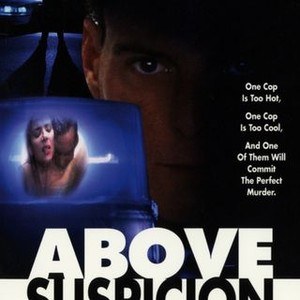
He grabs the reporter by the shirt collar and forces him to look at the corpse of the grocery store shooter’s lone casualty on a nearby gurney. (In reality, Stallone wrote the script himself.)Ĭobra is incensed that the media and pencil pushers won’t get out of the way and let him be great. It’s as if a Make-a-Wish kid got the chance to bring his idea of a rockin’ supercop to the big screen.
#ABOVE SUSPICION 1995 PLOT LICENSE#
Stallone’s detective Marion Cobretti works out of the vaguely defined “zombie squad,” keeps a matchstick in his mouth, weathers leather gloves at all times, and drives around in a 1950 Mercury with a license plate that reads “Awsum 50,” as he looks for suspects to rough up. “You’re the disease and I’m the cure”Ĭobra is a relic of its era, the mid-1980s, that now plays like parody. Sylvester Stallone as Lieutenant Marion “Cobra” Cobretti in Cobra. Eventually, the filmmaker attempted to do for cops with his film Cobra what he’d done for soldiers and boxers: give them a mononymed, aspirational, badass mascot. The police in his films went from fascist figures who should be eyed with suspicion to gritty heroes like conservative street cop Deke DaSilva, whom he played in 1981’s Nighthawks. Years later, antiwar activists at Harvard would protest Stallone during a campus visit for his portrayal of John Rambo, but in 1982’s First Blood, the character took on corrupt police in a small town.īut just as Rambo went from a crafty near-pacifist in First Blood to a machine gun-wielding, rocket-launching angel of death in its 1985 sequel, Stallone quickly changed his tone. He played an anti-war agitator taking direct action in 1973’s No Place to Hide, and a union leader who starts a riot in 1978’s F.I.S.T.

He gravitated toward the kind of anti-authoritarian parts that might get the actor put on a secret antifa watchlist today. Incredibly, some of his earliest roles went in the opposite direction.
#ABOVE SUSPICION 1995 PLOT TV#
Starting with appearances in the TV shows Police Story and Kojak in the mid-’70s, Stallone has acted as a cop a dozen times in his career.

The type before the prototypeĬonsidering that Stallone’s signature roles are a Vietnam vet and a boxer, it may be surprising how often he’s played improbably noun-named cops like Ray Tango and John Spartan over the years. During the 1980s and ’90s, Sylvester Stallone reigned supreme as our most prolific police-portrayer, and the arc of his cinematic message on law enforcement shows how American views on the topic can evolve-and still fall short.

But movies have also reflected and helped shape America’s views on cops in a major way.


 0 kommentar(er)
0 kommentar(er)
